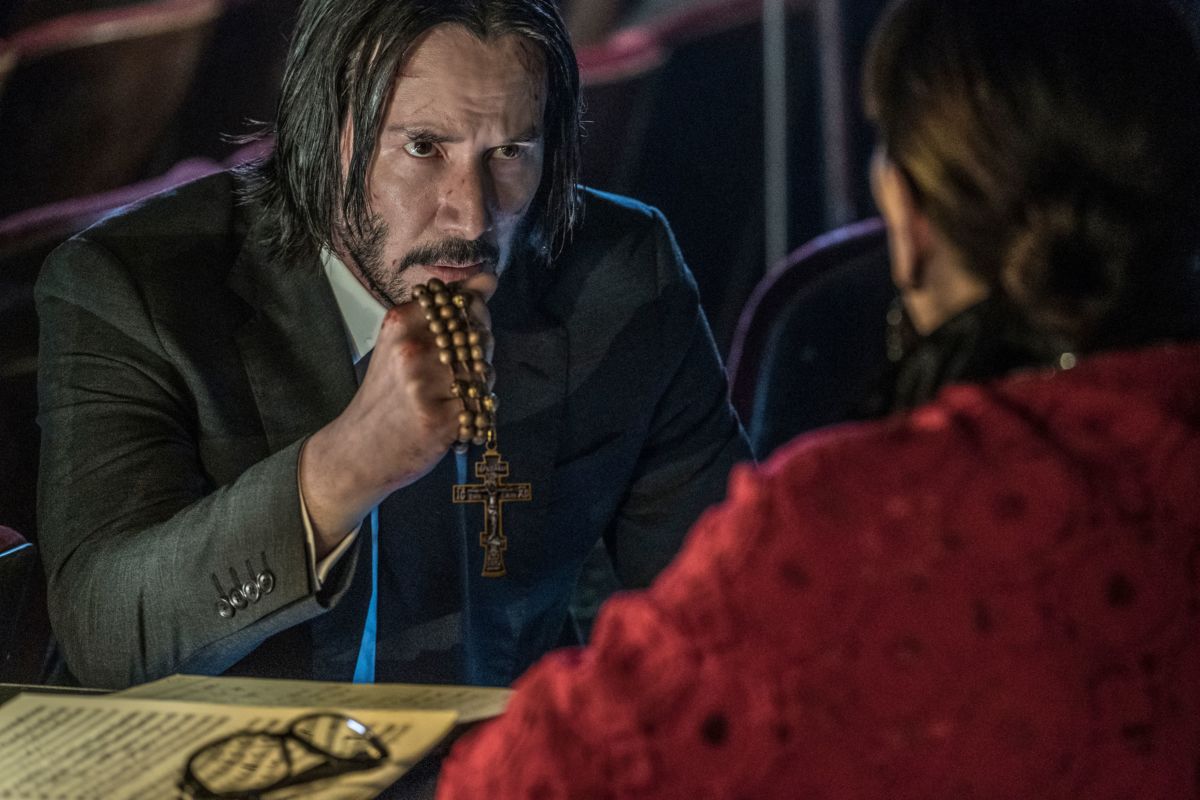We’re very, very lucky to have the John Wick movies. Likely the best “shoot-em-up” action movies of the last decade, the series continues to outdo itself with its sleek, brutal action sequences. The heart pumping fight choreography combined with the brilliant stunt work showcase how dazzling action filmmaking can be, but now three films in, the carnage in John Wick: Chapter 3 – Parabellum becomes a little deadening. Bullets fly and audiences cheer as Keanu Reeves takes down waves of anonymous henchmen in badass ways, but the emotional connection just doesn’t feel as strong this time around.
In Parabellum, John Wick (Reeves) finds himself with a $14 million bounty on his head that contract killers from all over are eager to collect. Picking up immediately after Chapter 2, Wick has been declared “excommunicado” after killing a man in the Continental Hotel, a designated safe space for the underground world of assassins that the reluctant killer once belonged to. But Wick isn’t the only one in deep water: the Continental itself, and its owner, Winston (Ian McShane), are under investigation by the High Table, the leadership of the assassin society. The High Table is going after everyone who’s bent the rules to assist Wick in the events of the previous two films, and of course, encouraging all of them to join the hunt for him.
There’s a reason why so many people end up helping John against their own self-interests – he’s the good guy who’s actually a good guy. When another assassin gives him a second chance during a fight, he makes sure to spare their life when he inevitably bests them. When a fight against a trio of killers gets interrupted, John gives one of them back their knife. After murdering a man with a book during a scuffle in a library, he makes sure to place the book back on its shelf. John Wick has been the perfect Keanu Reeves action hero; he carries Keanu’s constant aura of melancholy. He’s the reluctant hero, only having come out of retirement from killing because someone murdered his puppy, and now, only to stay alive. Wick is charming, but not a womanizer like other action stars. He keeps a photo of his dead wife on him at all times, further punctuating his tragic mentality.
Parabellum is at its most interesting when it takes a breath to examine who exactly John is. He hasn’t exactly received a long enough break throughout these three films to be able to figure that out for himself, but he’s given a question that sums up all you need to know. It doesn’t matter who he lives as, what matters is who he wants to die as. Living a life surrounded by death puts this question in perspective, John could be killed at any moment (god knows he comes close countless times), so what exactly is it that he’d be dying for when the moment comes? Is he the person he tried to escape from — a ruthless, efficient killer — or is he the person he tried to become, a simple man who only wanted a quiet life with his wife and dog?
Keanu is fantastic in the role as always, but Parabellum, much more so than either of its predecessors, turns the camera towards other characters and allows them a chance to shine. Halle Berry kicks ass as Sofia, an old friend of John who, like him, is a dog lover. She owns a very well-trained pair of them, and an action scene where she and her loyal canines take down a large group of bad guys is where the film is at its best – the action is as impeccable as ever. Mark Dacascos also stands out as Zero, a Japanese assassin whose skills are on par with Wick, and who becomes his deadliest opponent yet. Dacascos brings some much needed humor and levity to the film, and reminds audiences that these action-packed flicks are, above all, supposed to be a lot of fun.
As stated before, there’s some insight given into John’s state of being, and Zero serves as a mirror image (the two literally fight in a room full of mirrors) of the kind of person John never wants to become: a killer who enjoys the killing and relishes his own abilities to get the job done. But there’s still some emotional disconnect in Parabellum. The first two films were personal for John, and his motivations were easy to latch on to as a viewer. This time around, he’s merely running around trying to survive the endless waves of assassins sent after him. John has never exactly been a chatty kind of man, but dialogue for him is almost nonexistent in this film, making connection even more difficult.
Still, we get scenes of dogs annihilating bad guys’ crotches, Keanu Reeves shooting people while riding a horse through the busy streets of New York City, Laurence Fishburne monologuing while stroking a pigeon, and a drawn-out battle that takes place in a knife shop, so we definitely win more than we lose here. John Wick is a man who seems to want peace and quiet back in his life, but both he and the audience won’t seem to let him. There’s more shooting to be done if he’s ever going to get what he wants. As the title suggests: if you want peace, prepare for war. That war may not be as emotionally resonant or satisfying as it was in the past, but I’ll be damned if it isn’t still as fun and impressive as it’s ever been.
Some of the coverage you find on Cultured Vultures contains affiliate links, which provide us with small commissions based on purchases made from visiting our site.

